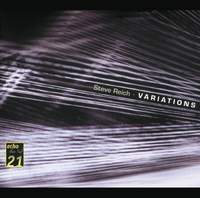An opportunity to discuss Reich’s music.
Music For 18 Musicians was this week’s Zoom music club piece, listened to by advocates of ‘classical’, rock, pop and jazz (I’ve been subjected to more 70’s prog rock than I really need). This is the one piece in about 26 weeks of Zooming that has united everyone in admiration, which is interesting, for it a work which appears to be musical marmite. I’ve detected elsewhere (albeit unscientifically) that those expressing a strong dislike tend to be happiest listening to music of the late 18th century and early romantic era. The version we listened to was the 1994 Nonesuch (my personal preference) rather than the original MCA. The transitions in the Nonesuch are smoother and more measured, reinforcing the slow evolutionary nature of the piece. I have yet to see it performed live, and hope the opportunity will come someday.
So, does 18 Musicians quicken your pulse, or induce unpleasant palpitations and migraine?
Apart from ‘It’s Gonna Rain’, I’m pretty much a sucker for all of Reich’s work (but can’t endure Glass - but that’s for another tread).
Music For 18 Musicians was this week’s Zoom music club piece, listened to by advocates of ‘classical’, rock, pop and jazz (I’ve been subjected to more 70’s prog rock than I really need). This is the one piece in about 26 weeks of Zooming that has united everyone in admiration, which is interesting, for it a work which appears to be musical marmite. I’ve detected elsewhere (albeit unscientifically) that those expressing a strong dislike tend to be happiest listening to music of the late 18th century and early romantic era. The version we listened to was the 1994 Nonesuch (my personal preference) rather than the original MCA. The transitions in the Nonesuch are smoother and more measured, reinforcing the slow evolutionary nature of the piece. I have yet to see it performed live, and hope the opportunity will come someday.
So, does 18 Musicians quicken your pulse, or induce unpleasant palpitations and migraine?
Apart from ‘It’s Gonna Rain’, I’m pretty much a sucker for all of Reich’s work (but can’t endure Glass - but that’s for another tread).





 ! Holst was interested in and strongly sympathetic to Eastern thought; he learned Sanscrit and translated a number of poems from The Upanishads, some of which he set for The St Pauls Girls' school choir, where he also taught before WWI, as well as for larger forces. I have a BBC broadcast tape of elderly St Pauls ex-pupils reminiscing about him, and can imagine him smiling down on Christopher from his portrait at Morley!
! Holst was interested in and strongly sympathetic to Eastern thought; he learned Sanscrit and translated a number of poems from The Upanishads, some of which he set for The St Pauls Girls' school choir, where he also taught before WWI, as well as for larger forces. I have a BBC broadcast tape of elderly St Pauls ex-pupils reminiscing about him, and can imagine him smiling down on Christopher from his portrait at Morley! 
Comment